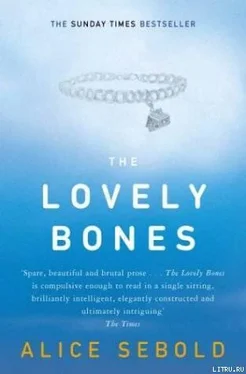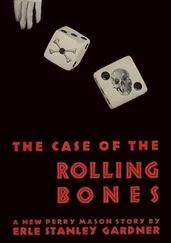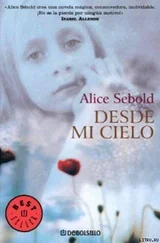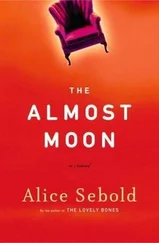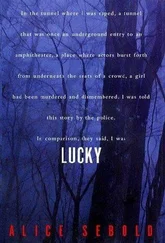When he had called the hospital, the nurse had told him Mr. Salmon was with his wife and family. Now his guilt thickened as he pulled his car into the hospital parking lot and sat for a moment with the hot sun coming through the windshield, baking in the heat.
I could see Len working on how to state what he had to say. He could work with only one assumption in his head – after almost seven years of ever more dwindling contact since late 1975, what my parents would hope for most was a body or the news that Mr. Harvey had been found. What he had to give them was a charm.
He grabbed his knapsack and locked up the car, passing by the girl outside with her replenished buckets of daffodils. He knew the number of my father’s room, so he did not bother announcing himself to the fifth-floor nurses’ station but merely tapped lightly on my father’s open door before walking in.
My mother was standing with her back toward him. When she turned, I could see the force of her presence hit him. She was holding my father’s hand. I suddenly felt terribly lonely.
My mother wobbled a bit when she met Len’s eyes, and then she led with what came easiest.
“Is it ever wonderful to see you?” she tried to joke.
“Len,” my father managed. “Abbie, will you tilt me up?”
“How are you feeling, Mr. Salmon?” Len asked as my mother pressed the up arrow button on the bed.
“Jack, please,” my father insisted.
“Before you get your hopes up,” Len said, “we haven’t caught him.”
My father visibly deflated.
My mother readjusted the foam pillows behind my father’s back and neck. “Then why are you here?” she asked.
“We found an item of Susie’s,” Len said.
He had used almost the same sentence when he’d come to the house with the jingle-bell hat. It was a distant echo in her head.
The night before, as first my mother watched my father sleeping and then my father woke to see her head beside his on his pillow, they had both been staving off the memory of that first night of snow and hail and rain and how they had clung to each other, neither of them voicing aloud their greatest hope. Last night it had been my father who’d finally said it: “She’s never coming home.” A clear and easy piece of truth that everyone who had ever known me had accepted. But he needed to say it, and she needed to hear him say it.
“It’s a charm off her bracelet,” Len said. “A Pennsylvania keystone with her initials on it.”
“I bought that for her,” my father said. “At Thirtieth Street Station when I went into the city one day. They had a booth, and a man wearing safety glasses etched in initials for free. I brought Lindsey one too. Remember, Abigail?”
“I remember,” my mother said.
“We found it near a grave in Connecticut.”
My parents were suddenly still for a moment – like animals trapped in ice – their eyes frozen open and beseeching whoever walked above them to release them now, please.
“It wasn’t Susie,” Len said, rushing to fill the space. “What it means is that Harvey has been linked to other murders in Delaware and Connecticut. It was at the grave site outside Hartford where we found Susie’s charm.”
My father and mother watched as Len fumbled to open the slightly jammed zipper of his knapsack. My mother smoothed my father’s hair back and tried to catch his eye. But my father was focused on the prospect Len presented – my murder case reopening. And my mother, just when she was beginning to feel on more solid ground, had to hide the fact that she’d never wanted it to begin again. The name George Harvey silenced her. She had never known what to say about him. For my mother, connecting her life to his capture and punishment spoke more about choosing to live with the enemy than about having to learn to live in the world without me.
Len pulled out a large Ziploc bag. At the bottom corner of the bag my parents could see the glint of gold. Len handed it to my mother, and she held it in front of her, slightly away from her body.
“Don’t you need this, Len?” my father asked.
“We did all the tests on it,” he said. “We’ve documented where it was found and taken the required photographs. The time may come when I would have to ask for it back, but until then, it’s yours to keep.”
“Open it, Abbie,” my father said.
I watched my mother hold open the bag and lean over the bed. “It’s for you, Jack,” she said. “It was a gift from you.”
As my father reached in, his hand shook, and it took him a second to feel the small, sharp edges of the keystone against the flesh of his fingers. The way he drew it out of the bag reminded me of playing the game Operation with Lindsey when we were little. If he touched the sides of the Ziploc bag an alarm would go off and he would have to forfeit.
“How can you be sure he killed these other girls?” my mother asked. She stared at the tiny ember of gold in my father’s palm.
“Nothing is ever certain,” Len said.
And the echo rang in her ears again. Len had a fixed set of phrases. It was this same phrase that my father had borrowed to soothe his family. It was a cruel phrase that preyed on hope.
“I think I want you to leave now,” she said.
“Abigail?” my father queried.
“I can’t hear anymore.”
“I’m very glad to have the charm, Len,” my father said.
Len doffed an imaginary cap to my father before turning to go. He had made a certain kind of love to my mother before she went away. Sex as an act of willful forgetting. It was the kind he made more and more in the rooms above the barbershop.
I headed south toward Ruth and Ray, but I saw Mr. Harvey instead. He was driving an orange patchwork car that had been pieced together from so many different versions of the same make and model that it looked like Frankenstein’s monster on wheels. A bungee cord held the front hood, which fluttered up and down as it caught the oncoming air.
The engine had resisted anything but a shimmer above the speed limit no matter how hard he pressed the gas pedal. He had slept next to an empty grave, and while he’d been sleeping he had dreamed of the 5! 5! 5!, waking near dawn to make the drive to Pennsylvania.
The edges of Mr. Harvey seemed oddly blurred. For years he had kept at bay the memories of the women he killed, but now, one by one, they were coming back.
The first girl he’d hurt was by accident. He got mad and couldn’t stop himself, or that was how he began to weave it into sense. She stopped going to the high school that they were both enrolled in, but this didn’t seem strange to him. By that time he had moved so many times that he assumed that was what the girl had done. He had regretted it, this quiet, muffled rape of a school friend, but he didn’t see it as something that would stay with either one of them. It was as if something outside him had resulted in the collision of their two bodies one afternoon. For a second afterward, she’d stared. It was bottomless. Then she put on her torn underpants, tucking them into her skirt’s waistband to keep them in place. They didn’t speak, and she left. He cut himself with his penknife along the back of his hand. When his father asked about the blood, there would be a plausible explanation. “See,” he could say, and point to the place on his hand. “It was an accident.”
But his father didn’t ask, and no one came around looking for him. No father or brother or policeman.
Then what I saw was what Mr. Harvey felt beside him. This girl, who had died only a few years later when her brother fell asleep smoking a cigarette. She was sitting in the front seat. I wondered how long it would take before he began to remember me.
The only signs of change since the day Mr. Harvey had delivered me up to the Flanagans’ were the orange pylons set around the lot. That and the evidence that the sinkhole had expanded. The house’s southeast corner sloped downward, and the front porch was quietly sinking into the earth.
Читать дальше
